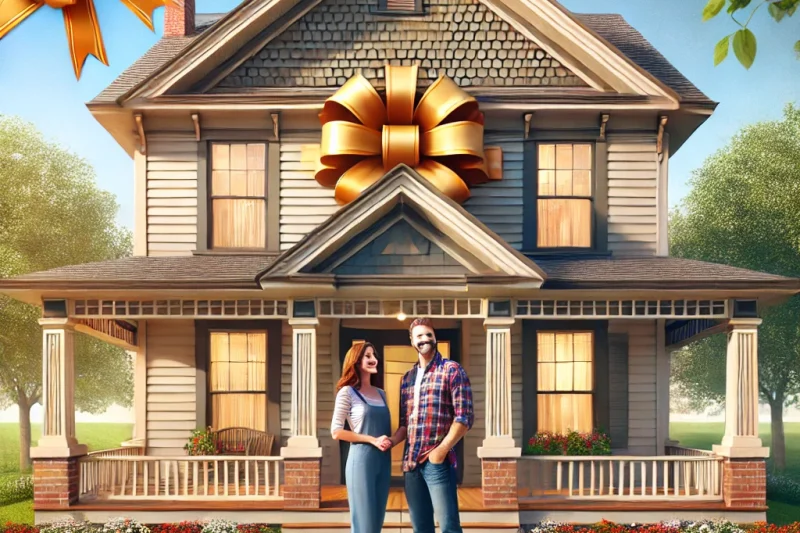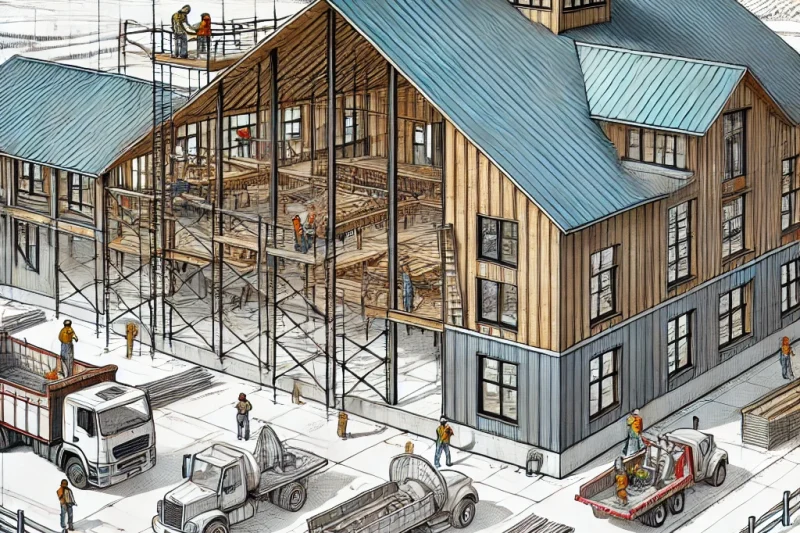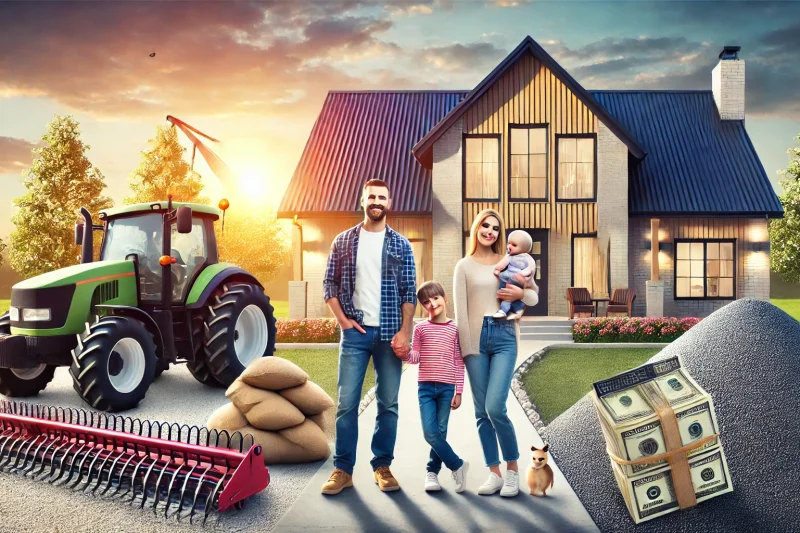Buy in Vernon Hills, IL with No Money Down!
“Unlock the Power of USDA Mortgages with Smart Mortgage!”
Vernon Hills, IL USDA Home Loan Guide
What is a Vernon Hills, IL USDA Mortgage?
Welcome to the Smart Mortgage guide on USDA Mortgages. Navigating the home financing world can be a daunting task, but understanding the various mortgage options available can significantly streamline the process. One such option that you might not be familiar with is the Vernon Hills, IL USDA mortgage. Let’s dive in.
1. Overview
A USDA mortgage, formally known as the USDA Rural Development Guaranteed Housing Loan, is a mortgage loan offered to rural property owners by the United States Department of Agriculture (USDA). Designed primarily to promote Illinois homeownership in rural and some suburban areas, the Vernon Hills USDA loan comes with a range of benefits that make it a viable option for eligible homebuyers.
2. Key Features
- No Down Payment: One of the standout features of a USDA loan in Vernon Hills, IL is the possibility of financing up to 100% of the home’s price. This means eligible borrowers can buy a Illinois home with no down payment.
- Competitive Interest Rates: Typically, USDA loans come with interest rates that are either at or below the market rate.
- Flexible Credit Guidelines: USDA loans often have more lenient credit requirements, which can be beneficial for those with a less than perfect credit history.
Vernon Hills FL USDA Loan Questions Call (888)416-4805
Get cash from your home.
Apply to see how a cash out refinance can help you.
Homebuyer Seminars
Discover the keys to homeownership at our local home buying seminar – your first step towards securing your dream home!
See our home loans.
Explore our diverse range of home loan programs tailored to fit your unique needs!
3. Eligibility Criteria
To be eligible for a Vernon Hills, IL USDA mortgage, borrowers must meet certain requirements:
- Location: The Vernon Hills, IL property must be located in an eligible rural or certain suburban area as defined by the USDA.
- Income Limits: There are specific income requirements, both minimum and maximum, based on the median income of the area.
- Creditworthiness: While the USDA is generally more lenient with credit scores, a certain credit standard must still be met.
- Primary Residence: The borrower must occupy the home as their primary residence.
4. Benefits of a USDA Mortgage
- Affordability: With no down payment and the potential for lower mortgage insurance premiums, a Vernon Hills, IL USDA loan can be more affordable in the long run.
- Inclusive: It’s a great option for Vernon Hills, IL first-time homebuyers or those without a substantial savings for a down payment.
- Supporting Rural Development: By opting for a USDA mortgage, you’re indirectly supporting the development and sustainability of rural communities.
5. How Smart Mortgage Can Help
Navigating the intricacies of USDA mortgages can be challenging. That’s where Smart Mortgage steps in. Our team of seasoned USDA mortgage professionals is here to guide you through every step, ensuring you make informed decisions tailored to your needs. Whether you have questions about your eligibility or the application process, we’re here to help.
Take the Next Step Interested in exploring if a Vernon Hills, IL USDA mortgage is right for you? Get in touch with our Smart Mortgage team today at (888)416-4805. We’re committed to helping you find the best mortgage solution for your unique situation.
Do you need a Pre-Approval?
We are here to help! Get a same day Vernon Hills, Illinois USDA pre-approval to shop for your dream home!
Mortgage Resource Center

USDA Loans in Illinois: Benefits, Eligibility, and Popular Cities
Buying a home is a significant milestone, and for many, finding the right loan program makes all the difference. If you're considering Read more
Barndominium Financing Made Easy with iLoanUSDA
Barndominium Financing Made Easy with iLoanUSDA: Your One-Time Construction Loan Solution Barndominiums, the stylish and practical combination Read moreMore information About Vernon Hills, Illinois
Vernon Hills is a suburb north of Chicago, Illinois in Lake County, Illinois, United States. The population was 26,850 at the 2020 census. Vernon Hills serves as a retail hub for its surrounding area (Libertyville, Lake Forest, Mundelein, Long Grove, Lincolnshire and Buffalo Grove).
The land that was to become Vernon Hills, founded by Richard Theodore Freese, Ron Freese, Nathan Kowitt, and Jim Carswell, began with the establishment of a 200-acre (0.81 km2) farm in 1857. Use of the land remained relatively static until the 1960s, when part of it was purchased for a residential community and golf course; the development was the first use of the name “Vernon Hills.” On June 16, 1958, the village officially incorporated with 123 residents and 125 houses in a single subdivision built by Quinn Hogan and Barney Loeb. During these times, the village and police department were run from a local motel until 1971 when village trustees bought two portable buildings. It saw steady but slow growth until the annexing of a plot of land near the corner of IL-60 and IL-21 in 1971, which led to the building of 1,200,000-square-foot (110,000 m2) Hawthorn Center. By 1980, the village’s population had grown to almost 10,000 residents, and by 2000, it had surpassed 20,000.
Through the 1980s and 1990s, the village grew geographically through the annexation of surrounding areas. This included land that would become the Corporate Woods business park and Centennial Crossing residential development (1986), a 1,200-acre (4.9 km2) section of Hawthorne-Mellody Farms (1988), and part of the village of Half Day (1994).
According to the 2010 census, Vernon Hills has a total area of 7.917 square miles (20.50 km2), of which 7.71 square miles (19.97 km2) (or 97.39%) is land and 0.207 square miles (0.54 km2) (or 2.61%) is water.
As of the census of 2010, there were 20,120 people, 7,568 households, and 5,312 families residing in the village. The population density was 2,708.3 inhabitants per square mile (1,045.7/km2). There were 7,813 housing units at an average density of 1,051.7 per square mile (406.1/km2). The racial makeup of the village was 81.86% White, 1.69% African American, 11.67% Asian, 0.10% Native American, 0.03 Pacific Islander, 2.92% from other races, and 1.72% from two or more races. Hispanic or Latino of any race were 7.19% of the population.
We Service the Following Locations in Florida



